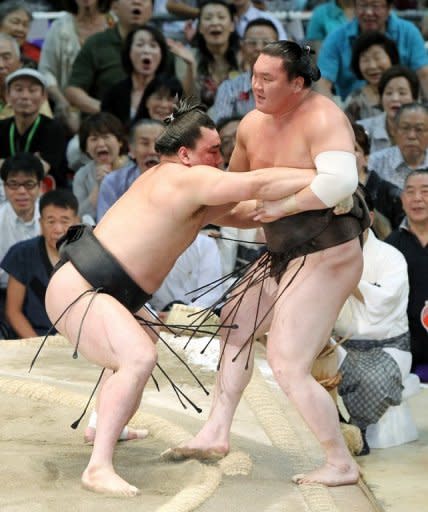Sumo tries to recruit baseball dropouts
A sumo stable handed out leaflets at a baseball recruitment ground on Friday, hoping to lure players to a sport that is struggling to attract new blood. Tokyo's Minezaki sumo stable was targeting a baseball stadium where players who had been dumped by the country's 12 professional clubs had gathered to look for a new job. Only one youngster applied for a sumo apprenticeship ahead of the season-closing tournament, which opens on Sunday, leaving this year's annual total of potential new recruits at a record low of 56. "Why don't you chase a dream by making use of your high physical ability," reads the handbill. "Grand sumo is a pro sport in which you can succeed without experience." "Every stable has the same recruiting problem," Minezaki stable master Nobutake Minezaki, told AFP. "I have no idea how many will turn to us." Officials from Nippon Professional Baseball, who are in charge of helping players find a second career at the end of their days in the diamond, planned to distribute a total of 100 flyers at Friday's tryout in Sendai, northern Japan, and another in Kamagaya near Tokyo on November 21. "I don't think any of the players will come to us immediately," said Minezaki stable official Kenjiro Kimura, who worked out the recruitment strategy targeting those who fell short of baseball's top ranks. "At least, we just want them to know there is an option of joining our stable as sumo wrestlers when they choose a post-baseball career," he told AFP. Kimura said there was one case in which a former baseball player made the grade in sumo: Kazuo Haji retired at the top rank of sumo's second division in 1975 after switching from a two-year career in minor-league baseball in 1965. The Minezaki stable has recruited three apprentices this year. A former cleaner at Tokyo's Hilton Hotel in January and two 15-year-olds in March. Kimura, a registered sumo referee, cited what he called a "negative spiral" in sumo recruitment -- a plunge in childbirths in Japan, a broadening choice of sporting careers including baseball and football, and scandals involving sumo. The sport is currently dominated by foreign-born wrestlers, with its top rank of yokozuna occupied by two Mongolians. Sumo's popularity has declined in recent years amid a spate of scandals involving sumo stars such as match-fixing, use of marijuana and illegal betting by the wrestlers on professional baseball games. In 2007 a 17-year-old apprentice died as a result of hazing by seniors at their sumo stable, discouraging young boys from seeking careers in the sport. In a bid to lure youngsters, the Japan Sumo Association loosened its physical standards for new recruits last May -- to 167 centimetres (5ft 6ins) and 67 kilogrammes (148 pounds) from 173cm and 75kg -- with the under-23 age limit intact. But it didn't stop the slide in recruitment and the annual total hit the lowest since the association instituted six regular 15-day tournaments a year. The previous low was 60 last year and compared with the most recent high of 223 in 1992 when two brothers, Wakanohana and Takanohana, reigned supreme. The all-time high was 250 in 1963. "It is a pity to see the limited number of applicants because sumo is a national sport," 17-year-old Fumiyasu Sato, the only applicant for the November tournament, told Japanese media. "I guess the number will grow again if they prevent the problems from recurring." Sato was expected to be formally approved by the association as a new recruit on Sunday.





